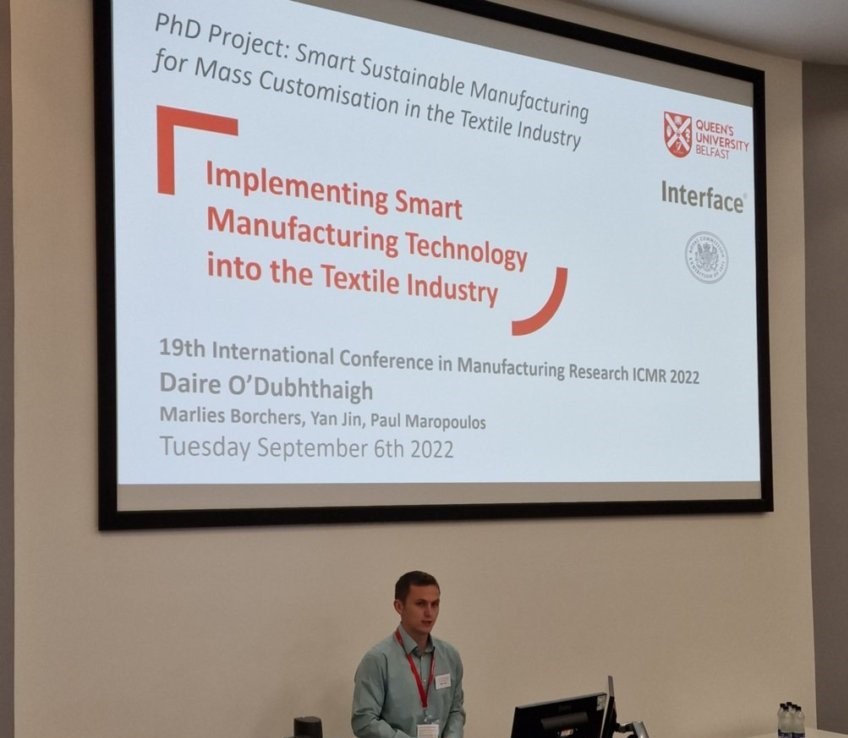Is smart manufacturing right for your business ?
As more and more aspects of our everyday life begin to incorporate smart technologies, it is surprising to see the manufacturing industry fall behind in the region of digitalisation. Historically, this sector has led the charge in advancing technology with innovation from the original industrial revolution causing a seismic shift in society still felt today. Ever since, manufacturing has been at the forefront of innovation however recently the uptake in autonomous systems and machine learning could be described as being “behind the curve”, especially in SMEs. Springco R&D manager and industrial PhD student Daire O’Dubhthaigh is seeking to investigate the cause of this issue and aims to address it while implementing smart solutions into the Springco production ecosystem.
Industry 4.0
This current wave of digitalisation in manufacturing has been dubbed the Fourth Industrial Revolution or Industry 4.0. It follows on from the original industrial revolution which shaped history with steam power, Industry 2.0 introducing electricity and petroleum to production lines and finally Industry 3.0 embracing computers and automation to take economies of scale to an entirely new level. What distinguishes the computing in Industry 4.0 from that of its predecessor is the data flow. In the past, computers simply replaced ledgers and interpreted user inputs to control simple automated processes however what cutting edge factories of today do is integrate smart sensors into their production lines. These sensors provide data to engineers but also crucially feed it into machine learning algorithms which seek to optimise parameters such as energy consumption, material waste and output rate for each process. They can also transfer information to entirely autonomous systems such as ‘cobots’, short for collaborative robots, which makes their operation alongside humans in a shared workspace safer and more efficient

Evolution of manufacturing throughout all 4 industrial revolutions – via LinkedIn
Uptake issues
Despite the advantages of operating one of these ‘factories of tomorrow’, there remains a significant number of businesses operating a generation behind the hypothetical ‘innovation curve’. These legacy factories are still largely paper based and although automation is present, there is no feedback loop of data and improvement. Typically their IT infrastructure is insufficient to support this wave of digitalisation and personnel are not trained or equipped to implement Industry 4.0 practices. The key reason for this? They haven’t had a reason to. Most SMEs have been able to operate and generate nominal turnovers with the dated technology at hand. This is however about to change as a result of several changes to the industry at large:
- Environmental concerns – climate change is a cloud which hangs heavy over every facet of life in the 21st century and manufacturing is particularly threatened, being historically one of the highest energy consuming industries. The objectives of Industry 4.0 directly align with that of the net-zero targets set by governments across the globe: streamlining the manufacturing processes to reduce waste, consumption, and emissions. It is no longer enough to simply recycle and call it a day, global warming is everybody’s problem. Businesses will no doubt come under more and more scrutiny to minimise their environmental impact with the first port of call being modern, efficient, data driven solutions.
- Aging work force – as any employer in the manufacturing industry will attest, there is already a massive skills shortage due to the diminished appeal of the industry in modern society. Manufacturing is no longer an attractive option for new university graduates and trades are being constantly overlooked in favour of education by much of today’s youth. Only compounding this issue is the aging work force currently propping up the industry. As more and more specialist workers near the end of their careers, the skills and knowledge lost in the generation gap could wreak havoc on manufacturing. The solution to this problem is of course automation and upskilling employees to face this new era of smart manufacturing, although shifts in approach of this magnitude take time. The best time to start was yesterday; the next best time is now.
Leading the charge
At Springco, Daire O’Dubhthaigh is currently undertaking research to address the aforementioned issues. His PhD in conjunction with Queen’s University Belfast is seeking to develop an implementation methodology for smart manufacturing projects in SMEs that are centred around what Daire believes are three key areas:
- Factory fitness
- Technology validation
- Business case feasibility

Springco R&D manager Daire O’Dubhthaigh presenting on his PhD
What this could mean for small businesses is a proven, well-researched path for them to follow to integrate these technologies into their everyday operations. This integration does not have to be an all or nothing approach and no doubt there will be a series of steps which can be taken (with increasing levels of commitment) to progress towards their digitalisation goals The stages primarily involve:
- Proof of concept – low investment feasibility models
- Prototyping – focus on developing a solution at a smaller scale for one particular process/area
- Acceptance testing – large scale roll out of the technology with extensive testing
- Continuous improvement – monitoring and tweaking of integrated solutions
Amongst the literature reviews and framework development, Daire will conduct a case study on Springco as he attempts to validate his research on a SME in the manufacturing industry. This will provide valuable real-world data for his PhD as well as furthering the smart manufacturing capabilities of Springco. Projects like the one being done by Daire at Springco will truly determine the future of manufacturing as no matter what direction is set by the industry leaders, if SMEs cannot follow then it cannot be considered a widespread success.
